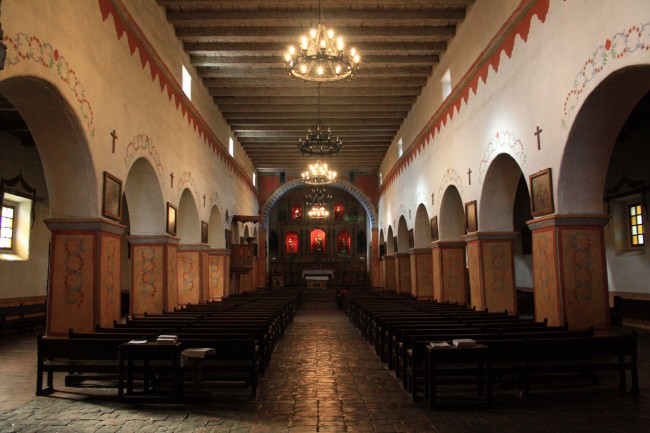San Juan Bautista
PHOTO BY ADAM BLAUERT
Central Valley and the Merced river
In 1806 a Spanish expedition into the Central Valley identified the Merced River as the most likely site for the first inland mission settlement. The recommendation was never acted upon because of the hostility of the valley’s Native American tribes.
Although the original inhabitants of California had often been friendly to the Spanish during their first contacts, many tribes became more wary as disease spread, land was lost, and those who came to live at the missions were not allowed to leave.
Many natives who fled the mission life ended up joining valley and foothill tribes beyond the active control of the Spanish.Although a number of land grants were made in the Valley after Mexico rebelled from Spain in 1821, there was never very much Spanish or Mexican settlement.
In Merced County, the San Luis Gonzaga, Santa Rita, Orestimba, and Panoche grants were the only permanent settlement sites in the 1840’s.
San Juan Bautista, in San Benito County
The closest town and closest mission of any size were located at San Juan Bautista, in modern San Benito County.
50 miles west of the current town of Los Banos, the mission was close enough to the valley that padres traveled along Los Banos Creek to recruit and/or capture natives to come to the mission.
“Path of the Padres” hike
The annual “Path of the Padres” hike offered by California State Parks at Los Banos Creek Reservoir gives hikers a chance to retrace part of this route and to learn more about California’s early history. This hike is offered from February through April each year.
Call (209) 826-1197 at the beginning of the year to make reservations. Or website:
http://www.parks.ca.gov/Events/EventDetail.aspx?id=5098
Today, San Juan Bautista is one of the best-preserved remnants of Spanish and Mexican California. It is a town that time has nearly forgotten, with a current population of less than 2,000.
Historic buildings dating from 1797 to the mid 1800’s surround three sides of the town’s plaza. The third side is open to the fertile San Juan Valley, with productive farmland stretching to the edge of the mountains.
San Juan Bautista’s plaza
The only town center in California where all of the buildings date back to the mid-1800’s or before.
The Plaza Hotel, Castro-Breen Adobe, Plaza Hall and Plaza Stable have been restored to the way they would have been then and are open to the public as part of San Juan Bautista State Historic Park.
Hours
Closed on Mondays and holidays, they are open from 10AM to 4:30PM Tuesday-Sunday. There are few other places in California where it is so easy to imagine the 1840’s, when California was still a province of newly-independent Mexico.
It’s a great place to learn about California’s history.
For more information go to: http://www.parks.ca.gov/?page_id=563.
Active Church
The mission is still an active church but is open to the public from 9:30AM to 4:30PM seven days a week. Visitors can see exhibits about mission life and wander through the church and the garden.
The church is one of the biggest and most impressive among California’s 21 missions. The thick adobe walls keep it surprisingly cool in the summer. A statue in front of the church commemorates St. John the Baptist, the church’s patron saint.
For more information go to: http://www.oldmissionsjb.org/index.html.
Special events
One block from the plaza is 3rd Street, the town’s main street. Lined by a collection of historic structures, including adobes dating back to the 1800’s, the street has many great restaurants and interesting shops.
The historic core of the town is pedestrian friendly and quiet. You may see chickens wandering the streets or cats sleeping beneath the pews in the mission church.
The cats are permanent residents of the mission and help to keep rodents from taking over.
Despite its size, San Juan Bautista has a busy calendar of annual community events, celebrations, and festivals.
These include annual arts and crafts festivals, car shows, art studio tours, food, music, and history events.
For a regularly updated schedule of events, go to http://www.sanjuanbautistaca.com/.
Students and children
The state park offers a “living history day” on the first Saturday of each month with costumed docents and events for children. 50 miles west of Los Banos on Highway 156, San Juan Bautista is a great place for a day trip or an easy stop on the way to Monterey Bay.
If you have a student in 4th grade who is studying California history, a trip to San Juan Bautista can bring it to life.
Nearby Fremont Peak State Park offers a campground, an observatory, and a relatively easy but exciting ½ mile hike to a summit with 360 degree views of the coast, Monterey Bay, and the surrounding mountains, hills, and valleys.






Adam Blauert, a high school teacher and avid outdoors enthusiast, has dedicated the majority of his life to Merced County. His passions include fishing, backpacking, delving into local history, and exploring the wonders of the western states.